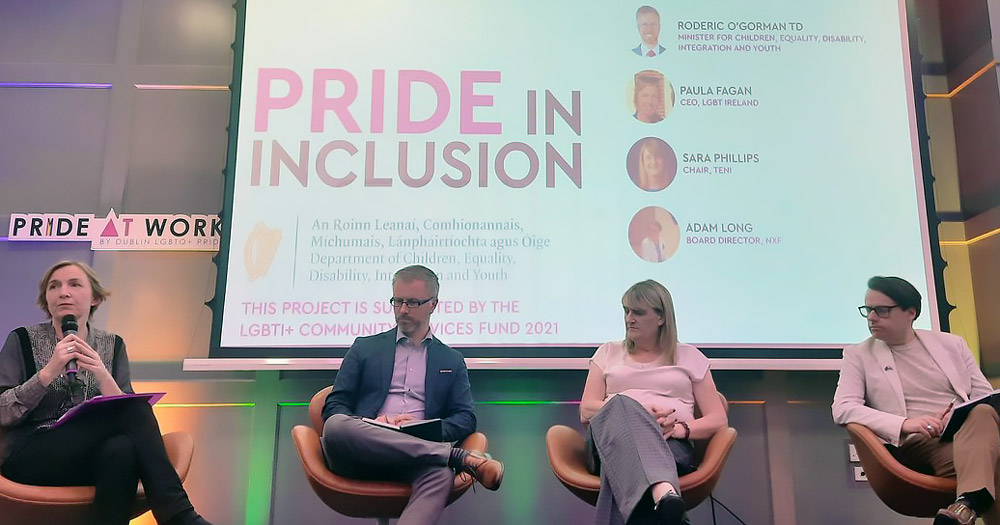On May 13, I (Adam Long) and fellow LGBTQ+ colleagues, including Minister for Equality Roderic O’Gorman TD, were invited to discuss current priority issues for our community, as part of the closing panel event of the Pride At Work 2022 Conference. Chair Paula Fagan of LGBT Ireland opened our discussion with a focus on Hate Crime legislation – identified by the National LGBT Federation (NXF) as the leading priority for the LGBTQ+ community in our 2016 ‘Burning Issues’ research.
The need to enact effective hate crime legislation has become an even more pressing concern for LGBTQ+ people in recent weeks following the despicable killings in Sligo, in addition to a wave of violent homophobic and transphobic hate attacks on our streets.
In my contribution, I welcomed the draft Bill published by the Government earlier this year which is fully LGBTQ+ inclusive, and noted how, in the wake of the recent shocking events, Justice Minister Helen McEntee committed to progressing the Bill “in a matter of weeks”.
Crucially, the legislation when finally enacted, must not be merely symbolic but actually capable of robustly responding to a particularly sinister type of ‘signal’ crime whose whole purpose is to instill fear among entire LGBTQ+ and other communities. The necessity for the law to be effective in practice means it also needs to be bolstered by proper training and resources.
Minister O’Gorman, in his response, agreed that hate crime legislation cannot be just well-intentioned but actually fit-for-purpose. He believes that the first number of prosecutions will help convey a clear message that Irish society will not tolerate people being targeted on account of their inherent identities.
The Minister welcomed the fact that unlike in many other jurisdictions where ‘culture wars’ are being cynically stoked for political purposes, there is strong support across our own political spectrum to advance LGBTQ+ equality issues.
He told us that the intention of the Government is to move forward with hate crime legislation before the summer recess and to have it on the statute books later in the year.
For her part, Sara Phillips of TENI (Transgender Equality Network Ireland) explained how the proliferation of online hate and extremism is having real-world consequences with an increase in violence against Trans people in particular. Indeed, the failure of social media platforms to properly regulate such material has seen the European Union step in with a ‘Digital Safety Act’, making clear, on this side of the Atlantic at least, that the era of self-regulation for these large tech companies is coming to an end.
Sara also went into great detail about the chronic lack of adequate healthcare for Trans citizens and how Ireland recently received a rating of zero in this area by the ILGA-Europe advocacy group.
With the Russian war against Ukraine continuing to unfold, the discussion turned to the plight of LGBTQ+ refugees and their particular vulnerability, made worse, as Paula Fagan noted, by the lack of even basic relationship recognition in Ukraine’s geographical neighbourhood where many of those fleeing Russian aggression have sought sanctuary.
Both Minister O’Gorman and I highlighted the extreme homophobia of the Putin regime and how the invasion of Ukraine actually amounts to a wider attack on Europe and our liberal democratic values. I also noted how LGBTQ+ rights are so often the ‘canary-in-the-coalmine’ when it comes to predicting the actions of autocrats like Russia’s Putin and Hungary’s Viktor Orban.
Another issue that captured the Panel’s attention was the need to ban so-called ‘Conversion Practices’. The Minister re-affirmed in very robust terms that the legislation he is committed to will protect all LGBTQ+ people from this abusive so-called ‘therapy’ – defined as a form of torture by the United Nations and wholly condemned by every reputable mental health and scientific body.
He attacked the actions of the British Tory Government, whose intention to exclude Trans people from protection has been met with widespread condemnation. The Irish government, he assured us, will adopt a very different approach and one that will ‘leave no one behind’.
I added that we should look at Boris Johnson’s Government in Westminster – and then do the very opposite, outlining how every other single jurisdiction that has outlawed this abhorrent practice has explicitly included both sexual and gender identity/expression, with France and Canada being particularly good examples of best practice in this area.
I also pointed out that the kind of loopholes around ‘consent’ provided for in the highly flawed British legislation renders any ban effectively meaningless – a point that survivors of this abuse have consistently made clear.
One such survivor is the inspiring Jayne Ozanne of the UK-based Ozanne Foundation, who travelled to Ireland this week to speak at the official launch of the LGBT Ireland-led campaign to outlaw ‘Conversion Practices’ and on whose Steering Group I sit.
Our Pride discussion ended with a sense that while Ireland has come a long way in very recent times, horrific events such as those in Sligo and the amplifying of hate and extremism on a global scale mean there is no room for complacency.
Or as President Michael D Higgins put it: The need to challenge a societal ‘lethargy’ that is preventing LGBTQ+ citizens from “living the fullest expression of themselves”.
© 2022 GCN (Gay Community News). All rights reserved.
Support GCN
GCN is a free, vital resource for Ireland’s LGBTQ+ community since 1988.
GCN is a trading name of National LGBT Federation CLG, a registered charity - Charity Number: 20034580.
GCN relies on the generous support of the community and allies to sustain the crucial work that we do. Producing GCN is costly, and, in an industry which has been hugely impacted by rising costs, we need your support to help sustain and grow this vital resource.
Supporting GCN for as little as €1.99 per month will help us continue our work as Ireland’s free, independent LGBTQ+ media.
